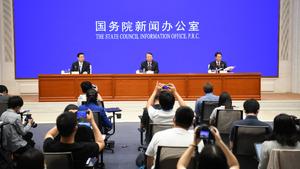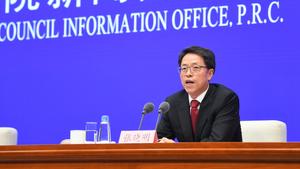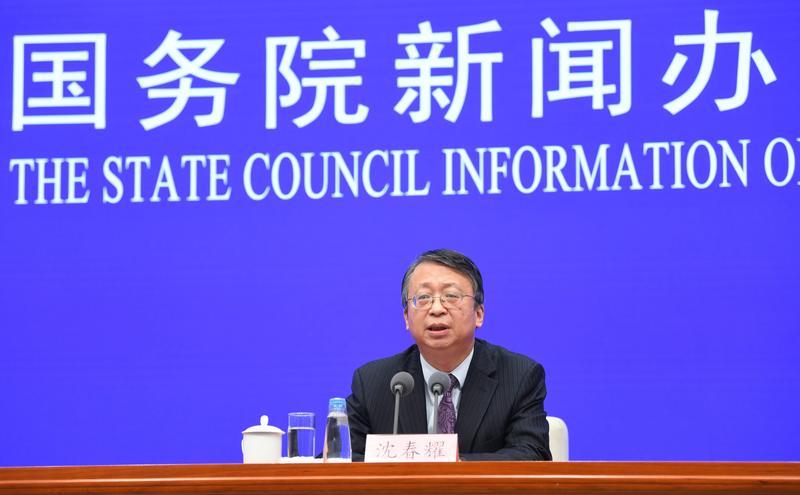 Shen Chunyao, center, director of the Legislative Affairs Commission of the Standing Committee of the National People's Congress, and Zhang Xiaoming, right, deputy director of the State Council's Hong Kong and Macao Affairs Office, take questions from the media at a news conference on the national security law in Beijing, on July 1, 2020. (PHOTO/XINHUA)
Shen Chunyao, center, director of the Legislative Affairs Commission of the Standing Committee of the National People's Congress, and Zhang Xiaoming, right, deputy director of the State Council's Hong Kong and Macao Affairs Office, take questions from the media at a news conference on the national security law in Beijing, on July 1, 2020. (PHOTO/XINHUA)
BEIJING - The law on safeguarding national security in the Hong Kong Special Administrative Region (HKSAR) will help the practice of "one country, two systems" go steady and far, a Chinese official said Wednesday.
READ MORE: Highlights of press briefing on national security law for HK
The new law fully complies with the "one country, two systems" principle and perfectly combines adhering to "one country" and respecting the differences between "two systems," said Zhang Xiaoming, deputy director of the Hong Kong and Macao Affairs Office of the State Council, at a press conference.
No one cherishes 'one country, two systems' more than us, and no one understands its true essence better than us.
Zhang Xiaoming, deputy director, Hong Kong and Macao Affairs Office of the State Council
To some extent, the law is aimed at correcting deviations from the right track of "one country, two systems" that occurred in the HKSAR, Zhang said.
"No one cherishes 'one country, two systems' more than us, and no one understands its true essence better than us," he said, noting that no country would ignore the constant occurrence of crimes endangering its security.
He also stressed that enacting a law on safeguarding national security in a local administrative region is entirely an internal affair of China.
Zhang also said the new law targets only a narrow category of crimes endangering national security, instead of the entire opposition camp in the HKSAR.
Zhang said Hong Kong is a society with diverse political views, adding different political views, including those not in the government's favor, can still exist.
But there are red lines and basic principles that cannot be breached in the "one country, two systems," Zhang stressed, noting that the opposition in Hong Kong should reflect on themselves and make appropriate adjustments in this regard.
Full confidence in HK's future
Hong Kong's status as an international financial center will not be undermined by the sanctions imposed by the United States, and China has full confidence in the special administrative region's future, said Zhang.
 Zhang Xiaoming, deputy director of the State Council's Hong Kong and Macao Affairs Office, speaks during a press conference held by the State Council Information Office on the national security law for Hong Kong, in Beijing, on July 1, 2020. (PHOTO / XINHUA)
Zhang Xiaoming, deputy director of the State Council's Hong Kong and Macao Affairs Office, speaks during a press conference held by the State Council Information Office on the national security law for Hong Kong, in Beijing, on July 1, 2020. (PHOTO / XINHUA)
Fundamentally, Hong Kong's status as a global finance center and its long-term prosperity and stability depend on two factors — whether or not its advantages in the business environment and financial system will be affected, the other is whether or not the momentum of the mainland's economic development and the central government's support for the SAR will be weakened, he said.
"For these two factors, we have confidence. Therefore, we are very optimistic about Hong Kong's future," Zhang said.
Closing institutional loopholes
Shen Chunyao, director of the Legislative Affairs Commission of the National People's Congress Standing Committee, also emphasized the importance of the law at the press conference.
The promulgation and implementation of the law will be of profound and far-reaching significance for upholding and improving the institutional system of "one country, two systems" under new conditions, safeguarding China's sovereignty, security and development interests, and ensuring long-term peace, stability and prosperity in Hong Kong, said Shen.
The law will effectively prevent, suppress and punish offenses endangering national security in relation to Hong Kong, and close Hong Kong's institutional loopholes in safeguarding national security, Shen said.
 Shen Chunyao, director of the Legislative Affairs Commission of the NPC Standing Committee, speaks at a press conference held by the State Council Information Office on the national security law for Hong Kong, in Beijing, on July 1, 2020. (PHOTO / XINHUA)
Shen Chunyao, director of the Legislative Affairs Commission of the NPC Standing Committee, speaks at a press conference held by the State Council Information Office on the national security law for Hong Kong, in Beijing, on July 1, 2020. (PHOTO / XINHUA)
But Shen said the new national security law will not replace Hong Kong's need to enact its own anti-subversion laws stipulated in Article 23 of its Basic Law.
Article 7 of the newly enacted national security law clearly stipulates that Hong Kong shall complete, as early as possible, legislation for safeguarding national security as stipulated in the Basic Law and refine relevant laws, he said.
ALSO READ: CE: National security law shows central govt's trust in HK
With the national security law in place, Hong Kong Chief Executive Carrie Lam Cheng Yuet-ngor, as well as the HKSAR government have said that relevant local laws will now be improved.
Shen said refining relevant laws, as required in the national security law, means the HKSAR government will not only advance national security, but also improve other existing laws, such as the Crimes Ordinance, to perfect Hong Kong's legal system.
He said the new national security law and Article 23 of the Basic Law share some similarities but are also very different. Article 23 lists seven types of crimes that endanger national security, whereas the national security law stipulates four. Secession and subversion are included in both.
Opinions widely heard
Opinions of different sectors of Hong Kong were taken into account during the process of making the national security law and the legislative work was strictly in line with Chinese laws, Shen said.
"During the lawmaking procedure, including the time before we drafted the law, we solicited views and opinions from government agencies and experts relating to Hong Kong affairs, by various means, especially people from all walks of life in Hong Kong," Shen said.
He said the NPC Standing Committee adjusted normal work procedures to speed up the legislation, but stressed the process was strictly in accordance with China's Legislation Law.
Zhou Mo, Zhang Yangfei, Cao Yin contributed to this report


